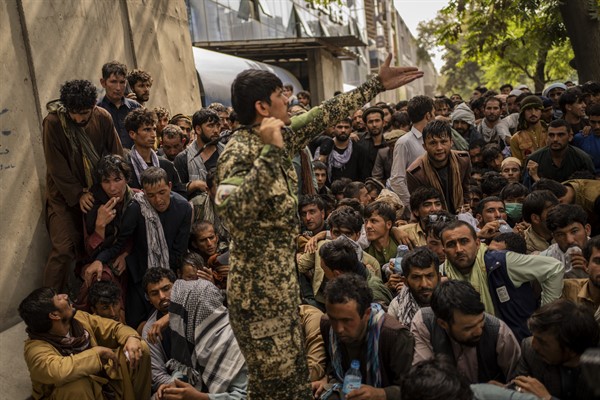As 2021 comes to a close, the international community faces several emerging humanitarian and security catastrophes—even beyond the global pandemic that has gripped the world for two years. Ethiopia is undergoing a complex and multifaceted civil war that has spurred a humanitarian disaster of monumental proportions, with nearly 1 million people now living in conditions approaching famine. Meanwhile, Russia has been building up its military presence on its border with Ukraine, increasing tensions with the West and prompting fears that there will be yet another attack on Ukrainian sovereignty. And in the Taliban’s Afghanistan, more children are expected to die this winter from starvation than total civilians killed in the past two decades of war.
Each of these crises is vastly different from the others—but the U.S. has responded to all of them with the same political tool: economic sanctions. In the case of Ethiopia, President Joe Biden has threatened to impose sanctions on members of both sides of the conflict, despite doubts about whether doing so would substantially affect either side. With Russia, Biden announced in early December that he was considering additional sanctions against members of Russian President Vladimir Putin’s inner circle, in an attempt to prevent an invasion of Ukraine. And with regard to Afghanistan, the Taliban takeover in mid-August prompted an immediate withdrawal of billions in foreign aid and the implementation of U.S. sanctions against the Taliban government, paralyzing the economy and pushing the country to the brink of collapse. Indeed, as Charli Carpenter wrote in her WPR column last week, there is a case to be made that sanctions by the U.S. and its allies have condemned many millions of Afghans to starvation.
Across the board, imposing sanctions has become an exceedingly common U.S. foreign policy response to acute and chronic repression, violence, corruption and anti-democratic behavior even beyond these prominent emerging crises. Last week, the U.S. imposed sanctions on individuals from Iran, Syria and Uganda for various human rights abuses; this week, it announced sweeping sanctions against Chinese officials, organizations and individuals associated with the potential genocide of Uyghurs and other Turkic minorities in Xinjiang province. That announcement came mere days after the U.S., United Kingdom and Canada imposed an initial round of sanctions on officials and entities in China, Myanmar, North Korea and Bangladesh.

